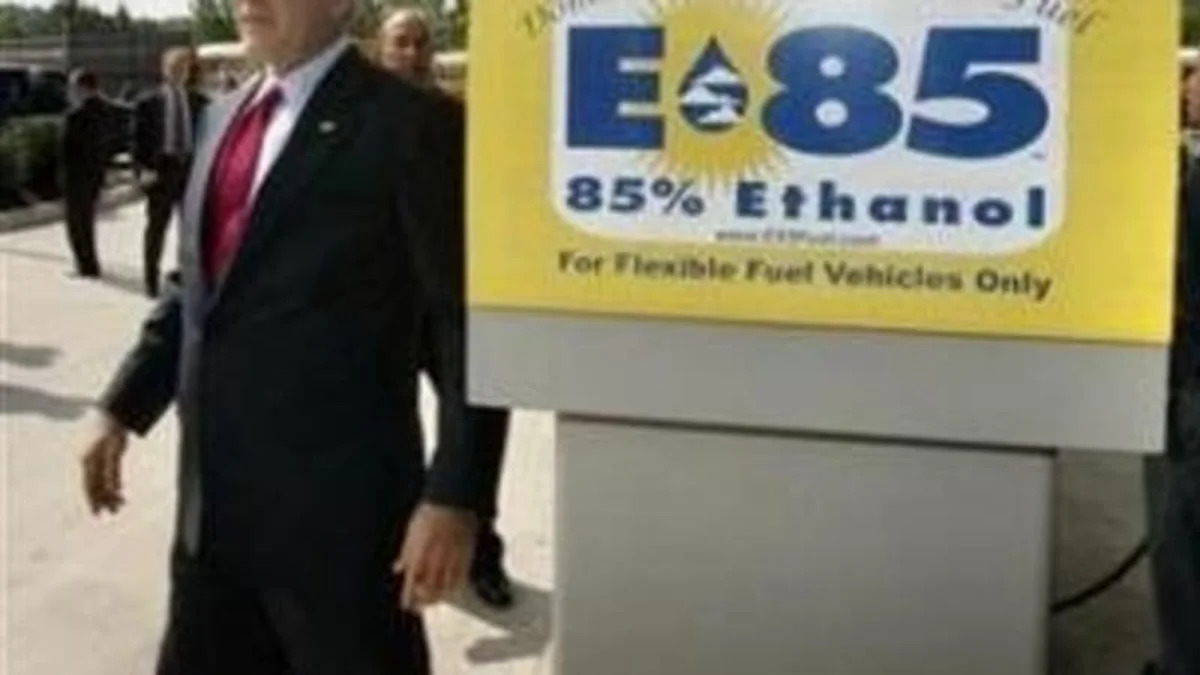Just in the last few days, we have shown you some different high-performance engines and vehicles designed to run on E85. We also showed you the fastest vehicle in the world that runs on E85. There has been much debate over the merits of such creations. This is not a question of whether they deserve coverage on our site - they absolutely do... we cover ethanol here. The question is this: Do these creations qualify as being environmentally friendly? I will give my opinion here.
Is ethanol better than dino-juice? I would say yes. Even in it's corn-derived stage here in the U.S., it burns off less carbon than gasoline. In my opinion, it would be better in a cellulosic-derived form, but let's work with what we have here for a minute, not what might or should be. The ethanol Americans can buy comes from here in the U.S., and is generally made by workers here too. Is that necessarily a bad thing? It helps our economy in its present form. I will not delve into how it impacts the land it is grown on, or in the price of corn. We all know that. But, I would still give it preference over gasoline imported from somewhere else for the reasons mentioned earlier. So, there is my opinion on the state of ethanol. In a nutshell, it is better than petroleum, right here and right now; it could be even better and hopefully will get there.
Now... performance comes into play. I would argue that performance cars (like the Viper) play a role in our society that should be filled somehow. I like the Tesla roadster a whole bunch. I want one really bad. I can't have one. Neither can you. There are none for sale right now. So, what is one to do if one wants to have a fast car? Buy one. That is the United States. Yes, we got ourselves into a bit of an environmental mess right about now... what with cars that pollute more and get worse mileage than in other countries. Those are what people bought in mass quantities. That, with any luck, is going to change with cars like the Tesla, and others which are still in their designers minds, soon. But, we are not there yet. So, a guy goes out and buys a performance car (say a Viper) and wants to make a statement about helping the environment in the process of enjoying his toy. He converts it to E85. Did he help the environment? Not really, no. What good did he do, then? Good question. One that I will answer with a brief true-story.
Click through to read more thoughts.
There is a Security Guard where I work, he is a young 22-year-old named Chris King. Good guy, we get along great. He loves cars, his girlfriend says that he is obsessed with them - much like many of us I imagine. He has even started his own automotive-aftermaket company called "Stage Performance", where he takes modern-day cars and modifies them for better performance. I told him that I am writing articles on two turbocharged Dodge Vipers, and he's thinking, "What does that have to do with being green." Understandable, as Vipers are the exact opposite, right? I tell him that they run on ethanol. That's too bad, how much power did they lose? I show him the dyno chart... Whoa! Over 1000 horsepower! How does it make that much power running on ethanol? Of course, I explained ethanol to him, what it is and how it works.
What was accomplished, at least once, was that the man who made the creation got another young man interested in ethanol, and wondering about the possibilities it has in today's marketplace. This is not a bad thing.
Lastly, I will go on record here and say that I think the future of transportation should be electric. I would rather see money being spent on batteries and capacitors than on hydrogen and ethanol. Here is why: We can go electric now. Most of us could get by with a vehicle that can go, say, 100 miles a day on electricity without using gas. For longer trips, perhaps a vehicle like the Volt is perfect - one that can go solely on electricity-only for a good distance, then switches its ethanol (or biodiesel, if you prefer) engine on to recharge when it is required. That can be the here and now. Perhaps the future is hydrogen. Nobody knows for sure yet. Read what Michael from the Rocky Mountain Institute has to say about hydrogen fuel cells and lightweight vehicles in my fellow blogger Dane's awesome interview. I am not writing off any new technology right now. But, let's start fixing the problem now with electricity and ethanol\biodiesel hybrids, then go to the next tech if and when we are ready.
I know that I am not the only person around here with opinions, dear readers. I hope you are willing to share yours as I have shared mine. If you want to hash out some other fuel options, click here. Please, share with the rest of the class what you think and would like to see happen. The floor is yours.
Discuss amongst yourselves... I'll give you a topic: "The performance and potential of ethanol."


Sign in to post
Please sign in to leave a comment.
Continue